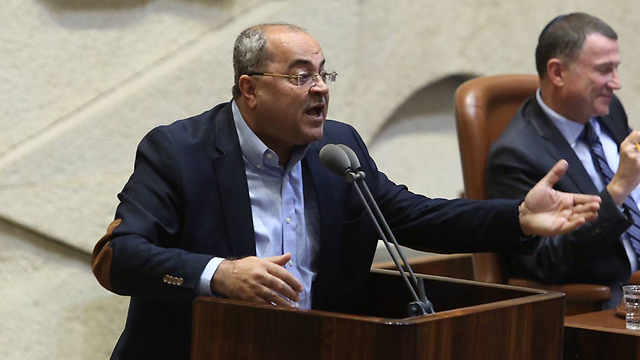

Ministerial Committee for Legislation confers war powers on Cabinet
In tumultuous week, ministers voted to pass bill transferring war powers from government to more exclusive Security Cabinet; PM Netanyahu asks coalition heads to send 'business as usual' message; committee will also discuss two Shabbat bills, one allowing minister to take into consideration Israel's traditions when providing Shabbat work permits—accepted in vote—and one barring opening of supermarkets on Shabbat.
The Ministerial Committee for Legislation voted Sunday to approve a proposal to take the authority to declare war from the hands of the government and confer it upon the more exclusive Security Cabinet. In order to be enacted the bill must also be passed by the Knesset.
The proposal sought to amend Basic Law: The Government to allow the prime minister to declare war or undertake a military operation with approval only from the Cabinet—even without all its members present—without having to receive approval from the entire coalition.
The amendment joins a list of a complex itinerary for the government this week with several potentially combustible issues on the docket, all with Coalition Chairman MK David Bitan being embroiled in police investigations on a municipal corruption scandal.
In light of recent developments, almost all of the controversial bills were removed from the schedule and did not go up to a vote. This past Monday, the same day Bitan was questioned at the offices of the police's Lahav 433 anti-corruption unit, only two bids remained on the schedule with the plenum being adjourned early shortly thereafter. In fact, activity in the Knesset was markedly sparse with several items the coalition intended to push through being postponed.
Sources within the Likud party admitted that since the Bitan affair had become public, the coalition's work had been halted almost completely in all meaningful respects. With the coalition chairman's investigation ongoing, the government is expected to tackle another complex struggle this week.
Bitan was forced to sit out of a coalition leaders' conference call held Saturday night for the very first time. Prime Minister Benjamin Netanyahu requested during the call most of the stalled bills be brought to a vote, and for the coalition to "close ranks, to send a message of stability."

"I'll be arriving directly to votes. I'm giving a personal example and expect you to do the same. Each and every one of you should look after your party's ministers and MKs," the prime minister instructed.
Shabbat front and center
The Ministerial Legislation Committee will be discussing two old-new bills Sunday. The first is an amendment to the Hours of Work and Rest Law sponsored by Labor and Welfare Minister Haim Katz (Likud), which is similar to a bill sponsored by MK Moshe Gafni (United Torah Judaism) and was approved by the committee last week. When it convened Sunday, the committee also voted to pass Katz's amendment.
The labor minister's amendment sought to instruct to take into consideration Israel's traditions when deliberating on providing permits for Shabbat work. The bill was put forward in the wake of the crisis erupting with the coalition's Haredi parties over works carried out on Shabbat—which led to the resignation of Health Minister Yaakov Litzman.

No less of a struggle is expected in the Knesset's plenum over the first reading of the Supermarket Law sponsored by Interior Minister Aryeh Deri, which seeks to endow the minister with the power to change or abolish municipal bylaws, thereby effectively barring supermarkets from opening on Shabbat.
The bill will put the coalition to yet another test, as the Yisrael Beytenu parliamentary group has already announced it will be breaking coalition ranks and voting against the bill.
The opposition, meanwhile, is preparing to fight it out and have already refused to consent to offsetting with the coalition. Even the Joint Arab List party, criticized for habitually allowing offsetting with the coalition, has announced they will not do so while voting on the bill.
"We'll be voting against the Supermarket Law for two reasons. Firstly, it is an explicit oppositional decision so as not to throw a lifeline to the very coalition we're interested in toppling," explained the Joint List's MK Ahmad Tibi.
"Secondly, we plan on voting against it due to the Haredi parties' past support of the Muezzin Bill (seeking to limit decibel levels for religious institutions—ed). I've contacted them in the past and made it clear it went against our holiest of holies. We've warned them in the past that what goes around comes around. Now it's coming around," Tibi said.
An additional bill facing its first reading is the Primaries Bill, securing state financing for every MK who runs in primaries of a party running for the Knesset. The bill is set to undergo a first reading and requires a 61-MK majority, not a simple undertaking for the coalition these days.
Apart from the above, a more demure version of the Recommendations Bill—barring police from making recommendations on indictments public—is expected to be put before the plenum for second and third readings.
After negotiations with Finance Minister Moshe Kahlon's Kulanu party, it was decided to place the investigations into the affairs of Prime Minister Netanyahu, which are already in progress, beyond the law's purview, and to put it to a vote this week.

















